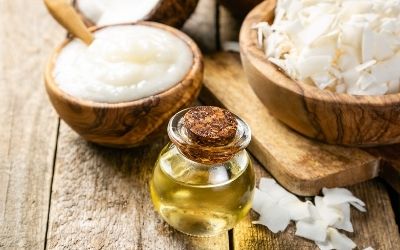All you need to know about MCT Oil
- By Patrick McCarthy (MSc)
- 19 Jul 2022


Medium-chain triglyceride (MCT) oil is a common supplement used in athletic populations for sports performance but also amongst individuals targeting fat loss.
The main reasons for the supplement’s use in these groups are because of the rapidly-absorbing nature of the fatty acids and the inability of the body to store these as fat.
But let’s break it down a small bit, and then dive into the benefits and potential uses first!
What is MCT Oil?

Medium-chain triglycerides (MCTs) are as the name suggests, medium-length fatty acids, which place them between short-chain and long-chain fatty acids. The three types vary simply because of the different chain lengths. These fatty acids are classified as saturated fat, which simply means that their carbon atoms are all bound with hydrogen ions. These fatty acids include:
- Caproic acid (C6:0)
- Caprylic acid (C8:0)
- Capric acid (C10:0)
(Source: Examine.com)
The most common sources of MCTs are coconut and palm oil, as well as dairy fat. For example, our high-quality formula is free of palm oil and is sourced from 100% coconut oil.
How does it act in the body?
As you will read below, MCT oil is composed of medium-length fatty acids. Because of their length, the MCTs are easy to absorb and utilize as energy. The shorter length also makes them more soluble and easier to dissolve in liquids.
Another key difference between MCTs and long-chain fatty acids (LCFAs) is the absorptive process. LCFAs require the actions of lipase and bile, before being packaged up in little particles, called chylomicrons, which help to transport them across the intestinal barrier.
On the other hand, MCTs don’t require these transporters and can readily diffuse directly into the portal vein system. This enables them to travel directly to the liver and bypass adipose tissue (Source: ScienceDirect).
Does it impact performance?

For the reason above, endurance athletes often use MCT oil supplements and formulations in the later stages of long-distance events when their carbohydrate stores have been depleted.
At this stage of an event, the athlete will be oxidizing (burning) fatty acids as the primary source of energy.
Thus, the line of thinking is that by infusing a source of readily available fatty acids (i.e. MCTs), you can better fuel performance at these stages. This may also help to spare some glycogen (stored carbohydrate) if they are consumed earlier in the event.
Does it enhance ketogenic and fasting diets?
In other spheres, MCT oil is used as a supplement to fasting, ketogenic and traditional dieting regimens. However, the evidence in support of this application is much less equivocal (in concordance). In fact, any supplement that promises to help you magically lose weight without attending to the diet should always be avoided!
The line of thinking is that when fasting or following a ketogenic (very low carbohydrates) diet the body is primarily mobilizing and burning fat for energy while producing ketones to power brain function.
It is proposed by some studies that by consuming MCTs during these dietary approaches, one can upregulate the production of ketones, oxidation of stored fat (long-chain fatty acids), and enhance fat loss, over muscle loss (Source: Examine.com; NCBI).
Does it enhance fat-loss?

When looking at the overall fat-burning effect of MCT consumption, several promising studies have been published over the past two decades! It is believed that MCTs are oxidized to a greater degree than LCFAs.
However, MCT intake may increase the oxidation of both of these, although more research is warranted in this area (Source: Nature).
It has been seen that regular consumption of MCTs, in place of long-chain fatty acids, can increase overall fat oxidation (burning; Source: Nature). Another proposed mechanism of MCTs in fat loss is the up-regulatory effect they may have on metabolic rate i.e. it may increase energy burned.
Of course, early studies in this area have led to miscommunications about MCT oil, many calling it a powerful fat burner and metabolic booster.
Whilst these studies are promising, supplements will rarely if ever have those previously-mentioned impacts on the body.

Wrap Up
As you can see, there are several promising applications for MCTs, especially when sourced from coconut oil, rather than palm oil.
It is always important to ensure you are considering the supplement for the right reasons, and not looking for a ‘quick fix.
Instead, MCT oil can be used as a complementary addition to your already optimised and balanced diet or training routine.
Hope this article was insightful!






